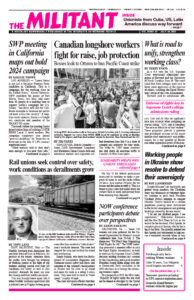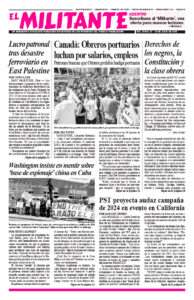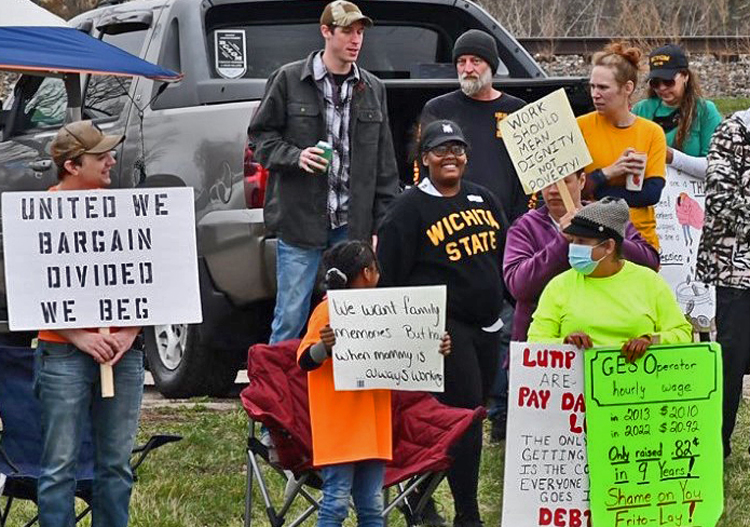ARLINGTON, Va. — Some 250 women and men gathered for the National Organization for Women’s annual conference here June 30-July 2. The theme was “We Won’t Stop: Organizing Until Equity for All.” The NOW leadership promoted a renewed effort to pass the Equal Rights Amendment, to work to overturn the Supreme Court’s Dobbs decision holding abortion isn’t covered by the Constitution, and a push to reelect President Joseph Biden along with other Democratic Party candidates in the 2024 elections as a strategy for advancing women’s rights.
First proposed in 1923, the ERA states “Equality of rights under the law shall not be denied or abridged by the United States or by any state on account of sex.” Passed by both the U.S. House of Representatives and Senate by 1972, NOW, other women’s groups, trade unions and others campaigned for ratification in states across the country. But only 35 of the 38 required states ratified the amendment before the 1982 deadline.
Plans were discussed for building a July 21 march and rally in Seneca Falls, New York, on the 100th anniversary of the first time the ERA was introduced in Congress. NOW leaders argued that a victory adding the ERA to the U.S. Constitution would provide a basis for restoring federally protected abortion.
Socialist Workers Party members participated in the conference sessions and workshops. They got a hearing for a working-class course to address the crisis of capitalism hitting working people and our families, which is central to the fight for women’s emancipation.
At one panel titled, “Three Realities: Dobbs Threatens Health, Women as Second-Class Citizens, and Clinic Violence,” Sara Lobman, a member of the Bakery, Confectionery, Tobacco Workers and Grain Millers union and Socialist Workers Party candidate for City Council in New York, spoke on defending workers, women and our families.
“Rising costs of rent, food, medical care and everything else are making it impossible to start and maintain a family,” she said. “Young people can’t afford their own apartments, let alone all the costs that come with raising children. And now the Biden administration plans to end the pandemic relief program for child care. Up to 3 million children could lose access.”
“Many women feel they don’t have a choice if they cannot afford to raise a family,” Pramila Venkasteswaran, president of the Suffolk Country, New York, NOW chapter, told Lobman later. “The choice to have a child should come with a choice to a living wage.”
“What’s needed is a union-led fight for jobs with schedules that allow for family time, for affordable child care and for a life outside of work, including an opportunity for union and political activity,” Lobman said. “The unions need to organize a fight for a supplemental income for working families, to allow them to keep working and fighting for a road forward.”
Venkasteswaran invited Lobman to join a panel organized by her NOW chapter later in the year on “labor issues and reproductive choice.”
Discussion on affirmative action
The recent U.S. Supreme Court’s decision on admissions policy at Harvard University and the University of North Carolina also spurred discussion and debate at the conference. Nathanial Spruill, from Clarksburg, Maryland, discussed the decision with Osborne Hart, Socialist Workers Party candidate for City Council in Philadelphia.
“I recently graduated from a magnet high school where race wasn’t considered for admittance. We were supposed to be proud of that, but it would have been better if there were more African American students like me there,” said Spruill. “Do you think discrimination on the job will increase now?”
“The Supreme Court ruling didn’t address discrimination in hiring or promotions on the job,” Hart said. “In fact, some justices counterposed decisions like that in the Weber case, which defended affirmative action with quotas in a Louisiana aluminum plant, to college entrance requirements.
“The working-class-based civil rights battles of the 1950s and ’60s that toppled Jim Crow segregation and tore down employment barriers for workers who are Black was a victory for the entire working class,” Hart said. “Affirmative action fights on the job that broke out in the 1970s tackled concrete effects of decades of discrimination. They helped unify workers and strengthened the unions. Today it’s not the same. It’s used to benefit the most privileged layers among Blacks, women and others, not strengthen class solidarity.”
Hart pointed Spruill toward Are They Rich Because They’re Smart? Class, Privilege, and Learning Under Capitalism by SWP leader Jack Barnes.
Hart also spoke with Vanessa Fields, president of Philadelphia NOW. Fields is president of the retirees chapter of American Federation of State, County and Municipal Employees District Council 47. “The recent 37 indictments against Trump under the notorious Espionage Act by the Biden administration is a part of criminalizing political opposition and closing down debate,” Hart said. “Attacks on constitutional freedoms are dangerous for working people, no matter who they’re aimed at today.”
“They are setting a precedent with Trump to go after other political organizations,” Fields said. “I remember how the FBI infiltrated the Black Panther organization and the bombing of MOVE in Philadelphia. While some people are glad they’re doing this to Trump, they are preparing to go after you.”
“I think that the raid on Trump’s home in Florida was justified,” Natalie Monarrez, an Amazon worker in Staten Island, New York, told SWP campaigner Candace Wagner. “He was hiding secret government documents.”
“Most of the secrets the U.S. government keeps are secret from us, working people, to prevent us knowing the capitalist rulers’ real plans to maintain their rule,” Wagner said. “The real target of the FBI has always been the unions and organizations fighting for change.”
“I’m active in the defense of Leonard Peltier,” Monarrez said. Peltier was a leader of the American Indian Movement in the 1970s. “Not only was he framed up by the FBI, but to this day that agency campaigns to keep him in prison. I’m beginning to understand what you’re saying.”
While the NOW leadership’s strategy of reliance on the Democratic Party dominated the conference, these discussions show the interest in fighting for change among many participants.
In addition to joining the conference discussions, SWP members kept up a literature table that drew considerable attention. Conference participants purchased almost $250 in books and got six subscriptions to the Militant.


